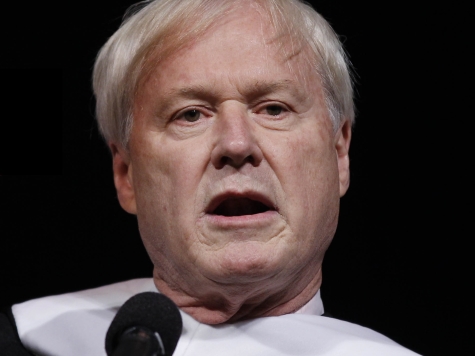
For the New York Times Sunday book review, historian David Greenberg of Rutgers University writes a devastating review of MSNBC host Chris Matthews’ new book about Ronald Reagan and Reagan era Speaker of the House of Representatives Tip O’Neill. Greenberg’s essential judgment is that the basis for Matthews’ entire thesis is false history.
Greenberg starts off his excellent review noting that since the days of the early republic, pundits and writers have pined for the day when politics in Washington made for “gentler times.” But, the United States didn’t even get out of George Washington’s presidency before the press filled up with recriminations and name calling, so there really never was a “gentler” political climate. American politics has always been a blood sport.
Greenberg praises some of the “few good books” that do mine the “gentler times” thesis with success, but then pointedly says that Chris Matthews’ book “isn’t one of them.”
The idea that Matthews wanted to promulgate with his new book, Tip and the Gipper: When Politics Worked, is that during the Reagan era Washington wasn’t as mean spirited as it is now and “after 6PM” House Speaker O’Neill and President Reagan could meet privately and make deals that positively impacted the country. Greenberg finds the whole conceit laughable.
But first the reviewer undermines Matthews’ very reputation in a brutal slap at the “snarling head’s” credibility.
“Matthews,” Greenberg quips, “is best known today as an MSNBC talking head–snarling head, some might say–a kind of Democratic Pat Buchanan giving voice to the resentments of the disgruntled middle class. For those familiar with his brand of confidently asserted over-generalization, the book is about what you would expect.”
In so many words Greenberg avers that over-generalization makes for bad history.
Matthews, Greenberg observes, says repeatedly in his book that, “Reagan and O’Neill liked each other enough to put politics aside at 6 o’clock… and strike deals in everyone’s interest.” Of this claim, Greenberg is blunt: “It’s a nice idea for a book, if only it were true.”
“Most important,” the Times reviewer says, “Matthews provides no evidence to suggest that whatever personal amicability O’Neill and Reagan maintained mattered.”
Greenberg goes on to point out that Ronald Reagan pretty much “rolled” Tip O’Neill in nearly every important political fight and that O’Neill wasn’t even very effective in whipping his own caucus into line as Democrats routinely abandoned the Democrat establishment to side with the popular Reagan during his eight years in office.
This undermines Matthews’ fantasy that O’Neill and Reagan worked behind the scenes very much to make policy, the reviewer points out.
Greenberg also slams Matthews’ insistence that Reagan and O’Neill were political equals and that both were typical Irish politicians. Reagan, Greenberg correctly points out, never had any of the hallmarks of a typical Irish politician. Reagan had, “no base in urban neighborhoods, no feel for tavern politics, little experience with legislative horse-trading.
“Irishness was no more part of his persona than it is of Barack Obama’s, and it’s jarring to see Reagan described repeatedly in such terms,” Greenberg says.
As to being political equals, O’Neill was never able to emulate the deep impact Reagan had on the nation, his party, or his ideology.
The final paragraph essentially calls the book a slipshod mess.
“One gets the feeling none of this matters much to Matthews, lest it interfere with a good, sentimental yarn. He surely knows that O’Neill didn’t have much to do with Reagan’s historic accords with Mikhail Gorbachev, and that the 1980s were a fiscal disaster, and that calling Reagan an Irish-American politician a half-dozen times doesn’t make him one.”
Greenberg’s conventional left-wing pronouncement that Reagan was a “financial disaster” aside, this is a devastating review with facts knocking down Matthews’ fantasies one by one.
The historian’s final words cut Matthews to the quick.
“Say this for Matthews: He has a fine appreciation of blarney.”
As a pronouncement on a book that is supposed to be informed by history, these final words are painful, to say the least.

COMMENTS
Please let us know if you're having issues with commenting.